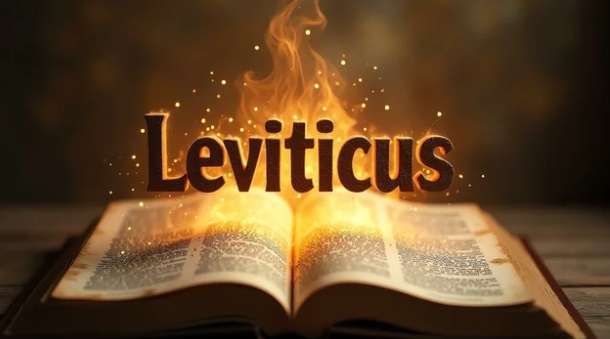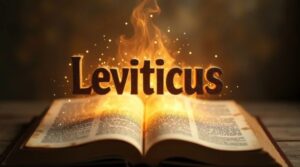
1. Laws on Sacrifices (Chapters 1–7)

-
Instructions for various offerings:
-
Burnt offerings
-
Grain offerings
-
Peace offerings
-
Sin offerings
-
Guilt offerings
-
-
Purpose: To maintain a right relationship with God and atone for sins.
2. Consecration of the Priesthood (Chapters 8–10)
-
Aaron and his sons are ordained as priests.
-
Emphasis on the holiness and responsibilities of the priesthood.
-
Includes the death of Nadab and Abihu for offering unauthorized fire.
3. Laws About Ritual Purity (Chapters 11–15)
-
Clean vs. unclean animals (dietary laws).
-
Rules concerning childbirth, skin diseases, and bodily discharges.
-
Purpose: To keep the community ritually clean before God.
4. The Day of Atonement (Chapter 16)
-
Description of Yom Kippur, the most sacred day.
-
The high priest enters the Holy of Holies once a year to atone for the sins of the people.
5. Holiness Code (Chapters 17–26)
-
Call to moral, spiritual, and social holiness.
-
Includes:
-
Sexual conduct laws
-
Prohibition of idolatry
-
Justice and fairness
-
Care for the poor and strangers
-
Festivals and Sabbaths
-
-
Key theme: “Be holy, for I the LORD your God am holy” (Leviticus 19:2).
6. Vows and Tithes (Chapter 27)
-
Rules on making vows and offerings to God.
-
Instructions on redeeming things dedicated to the Lord.
Summary of Themes:
-
Holiness: God calls His people to be holy in every aspect of life.
-
Sacrifice and Atonement: Essential for maintaining a relationship with God.
-
Purity: Both moral and ritual purity are important.
-
Priesthood: Mediators between God and the people.
Leviticus – Main Points Summary
Leviticus is a book of laws and instructions given by God to help the Israelites live holy lives and worship Him properly.
1. Sacrifices and Offerings (Chapters 1–7)
-
God explains different kinds of offerings:
-
Burnt (to honor God)
-
Grain (to thank God)
-
Peace (to celebrate with God)
-
Sin and Guilt (to say sorry for sins)
-
-
These sacrifices helped people maintain a close relationship with God.
2. Priests and Their Duties (Chapters 8–10)
-
Aaron and his sons are chosen to be priests.
-
They must follow special rules to serve God.
-
When two priests disobey God, they die as a warning to others.
3. Clean and Unclean Things (Chapters 11–15)
-
Rules about clean and unclean animals (what can and can’t be eaten).
-
Laws about health (skin diseases, mold, etc.).
-
Staying clean was a way to show respect for God.
4. The Day of Atonement (Chapter 16)
-
A special holy day where the High Priest asks God to forgive all the people.
-
A symbol of complete cleansing from sin.
5. Living a Holy Life (Chapters 17–26)
-
God wants His people to be holy in how they live.
-
Laws about:
-
Treating others fairly
-
Respecting parents and elders
-
Avoiding sin and idols
-
Celebrating holy days like the Sabbath and festivals
-
6. Promises and Warnings (Chapter 26)
-
If the people obey God, He will bless them.
-
If they disobey, there will be trouble and punishment.
7. Vows and Giving to God (Chapter 27)
-
Instructions on how to make promises (vows) to God.
-
How to give back to God what belongs to Him.
✨ Key Message:
“Be holy, because I, the Lord your God, am holy.” (Leviticus 19:2)
50 Questions and Answers About the Book of Exodus
What is the literary style of Exodus?